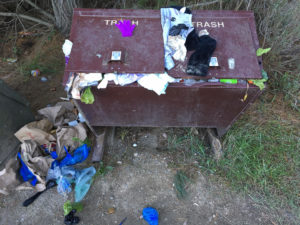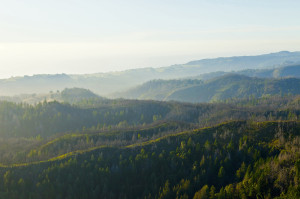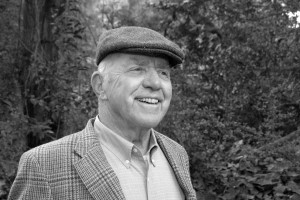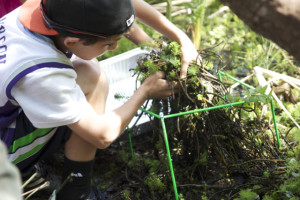Q: When did you first start to think about the environment?
A: I can’t really say that there was a defining moment that I remember, like an epiphany. I can say it was something that I grew up around in Southern California. It was a good time, in the thirties and forties—a good time to grow up; it wasn’t a good time economically, but there was a lot of open space. It was pretty accessible; we could go to the beach on a bus or on the streetcar.
My first involvement in environmental action was as a lawyer, when I took Marin County to court to stop a huge development on what is now part of the Golden Gate National Recreation Area. It was called Marincello. Gulf Oil and a developer came out from Pittsburgh to essentially transform the landscape in a fairly oppressive, seductive manner. It was a very important turning point in this county, where I got involved not so much for an environmental purpose as a civic purpose. I just felt it was terrible that a few people could turn around an entire landscape, and not even consult the local citizens. Remember, this was in the sixties, before NEPA [National Environmental Policy Act] and environmental impact statements and things like that. There was a personal reason for me to get involved—namely, bad politics, and it led me into a seven-year struggle alongside several other lawyers and some community people to affect the outcome on the land. That was what got my juices, if you will, flowing and stirring about the environment as an issue.
Q: Was that when you got hooked into being an environmentalist?
A: It wasn’t a hooking, it was an evolving awareness and deepening commitment to aligning my energies and my hopes. This was no big, broad, global warming issue. I was the father of two, living in this community. It was a fairly local, tangible threat that I felt I had to get involved in, and so I did. Then later, that morphed into the Nature Conservancy, which declined to further involve itself in projects of that kind, namely urban/suburban/rural interface. And that led to my involvement with the Trust for Public Land, with Huey Johnson. I was a member of their first board of directors, and stayed for 30 years.
Q: You are one of the few people I’ve interviewed who has mentioned cities, urban development.
A: There are some people who think the only environment worth paying attention to is out there, unsullied by man, which is wrong! It is part of it. But I firmly believe that we’re not going to save anything out there for long if we write off the cities where most of us live and work. We’ll lose them all. If we make life in the cities so unfit for humans—guess what! Those who have the legs and the money are going to get out of here and get their two or three acres in the woods. And we will just spread out again, with our 6 billion multiplying at a rapid rate that we have never experienced before. So I think it’s a very shortsighted, doomed—a strong word—policy that says we can skip the cities, that all we have to worry about are the critters who live out yonder. That is very attractive because it is less threatening, less risky; “We don’t have to worry about the social problems—the racism and the terrible schools and the crappy health care system. We’re worried about biodiversity, so we don’t have to get involved in that other stuff.” It’s very attractive, very seductive. But shortsighted. Wrong.
I’m always looking for linkages. It’s not just the wide open space—oh, isn’t it gorgeous!—it’s the wide open spaces in a community. The wide open spaces in connection with water, jobs, respect, dignity, home. When I took my class from the Yale School of Forestry to New York City we spent part of our time in Sterling Forest, outside the city. Beautiful in fall, extreme color. And the next day I took them into the bowels of the Lower East Side to look at community gardens. I wanted them to see it’s the same earth. And it’s we who are on the earth who can make it more positive or less positive. I don’t know whether global warming is going to end it all for us, but if we don’t address the issue, it will for sure get worse. We still have a chance, possibly, to make it better. That’s what I think the human challenge is all about. People ask me whether I’m an optimist or a pessimist. Who cares? Are you engaged or are you indifferent? If you ‘re engaged, you’re alive. If you’re indifferent, you’re dying.
Q: You’ve been a successful lawyer, but you’ve also spent a lot of time with Trust for Public Land and other nonprofits. Where do you think that sense of giving back came from?
A: I think a big part of that comes from my parents. I’m a first-generation American. My father was a farm boy from Kamenkashirk in Poland; he came here in his teens, as a stowaway, in World War I. My mother did the same, leaving in the middle of a pogrom in Kiev. They settled in Chicago, Omaha, and finally Los Angeles. The fact that we were here was kind of a miracle. It was bred into both my older brother, Larry—who went on to become a world-renowned neuroradiologist—and me that we were the luckiest people ever born. And that we have an obligation, therefore, to spread that luck. It is nonnegotiable. We had a lot of help. And we are more than grateful. We are determined. We are determined to give back. Period. And it’s not a big burden; it’s a great joy.

.jpg)



